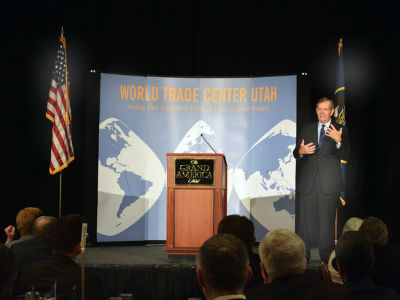Whoever is the next president, he or she will have “a significant impact” on pending free trade agreements and their effects on Utah’s economy, the leader of World Trade Center Utah said last week.
Whoever is the next president, he or she will have “a significant impact” on pending free trade agreements and their effects on Utah’s economy, the leader of World Trade Center Utah said last week.
Speaking at the Thought Leader Symposium, co-hosted by World Trade Center Utah and Zions Bank, Derek Miller said the Trans-Pacific Partnership (TPP) will be the largest free trade agreement since the North American Free Trade Agreement (NAFTA). Congress will consider TPP after the election “and the next president will have a significant impact on how that plays out,” said Miller, WTCU’s president and chief executive officer.
“The dramatic value of watching these primaries play out on TV is even better than watching the TV show ‘Keeping Up with the Kardashians,’ or so I was told,” Miller said. “However, the true reality is whoever occupies the Oval Office in 2016 will have the power to significantly influence international affairs and international business.
“The next president will have a lot to deal with in areas of foreign affairs. There are escalating tensions with Russia, an ongoing civil war in Syria and the resulting refugee crisis, and, of course, the growing threat of terrorism. The president’s foreign policy positions will be more important to the safety and security of the United States than ever before.”
The TPP “reduces almost all the trade barriers for U.S. companies in the areas where Utah exports the most,” Miller said, listing chemicals, transportation equipment and food products and adding that TPP countries represent one-third of Utah’s exports.
Also to be considered by the next president is the Transatlantic Trade and Investment Partnership (TTIP), involving European countries.
“Europe is our longest-standing and largest trading partner,” Miller said. “Reduced barriers to entry in these markets would be particularly important to Utah’s medical device and nutraceutical companies.”
Combined, the nations involved in the two agreements represent 64 percent of the world’s GDP.
“This is important for the United States and important for Utah, which has a competitive advantage in many of the industries that could become more accessible to Utah companies,” Miller said. “While many states bemoan that they come out on the losing end of free trade, that is not true for Utah.”
Utah, in fact, has an annual trade surplus of $4 billion. “Trade is very good for Utah, and exports are an important part of our very diverse economy,” he said.
Utah’s export growth from $12.3 billion in 2014 to $13.4 billion in 2015 represents an 8 percent rise, which he described as “an astounding number” and makes Utah the ninth-best state for export growth.
While Miller mentioned no presidential candidate by name, getting support for the free trade agreements might be a challenge. Among the five remaining, only Ohio Gov. John Kasich, who voted for NAFTA, supports TPP. Donald Trump, for example, has called TPP “a disaster” and “very bad for a lot of reasons.” In a column for USA Today, Trump said TPP is “a mortal threat to American manufacturing” and “the biggest betrayal in a long line of betrayals where politicians have sold out U.S. workers.”
Former Utah Gov. Mike Leavitt also spoke at last week’s event but mentioned no candidate, although he has supported Kasich. Gov. Gary Herbert spoke but did likewise despite his endorsement of Texas Sen. Ted Cruz.
Neither Herbert nor Leavitt discussed the trade agreements during their remarks at the symposium, but Leavitt presented details about various scenarios for the Republican candidate nomination process. “We’re going through a uniquely American experience,” Leavitt said, including learning about primaries, the convention process “and the way our democracy works.”
As was the case with Mitt Romney at this point four years ago, it is uncertain whether Trump can get the required delegate count for nomination because other candidates remain in the race. Leavitt calculated that Trump needs 52 percent of the remaining delegates to reach the 1,237 needed for nomination.
“The point I’m making here is that the chances that Donald Trump will get 1,237 are certainly not zero, but there are very many pathways in which he would not get 1,237,” Leavitt said.
Contested conventions are actually not that uncommon. They have happened 10 times in the GOP, 16 times for the Democrats.
Leavitt did not reveal what he believes is the most likely scenario for Republicans regarding the convention but said there are four possibilities. One is that Trump falls barely short of the delegate count before the convention but makes up the difference between the final primary and the convention. Another is that Trump falls considerably short, meaning a second ballot at the convention, “which will then be fascinating,” he said. Third, in what he described as “not an outlandish scenario,” Kasich emerges as the nominee after several ballots. The final one is the convention selecting a “new” candidate, but Leavitt said, “I think the chances of that are pretty low.”
The selection of a new candidate would require a change in the party’s rules, he noted.
“I think that’s highly unlikely, but we are in uncharted territory here and I don’t think there’s any clarity, other than what the rules are today and the ways it has unfolded in the past,” Leavitt said. “And I think we can all begin to buckle our chinstraps and enjoy what I think is going to be a lesson in the way our democracy, our two-party system, works.”








